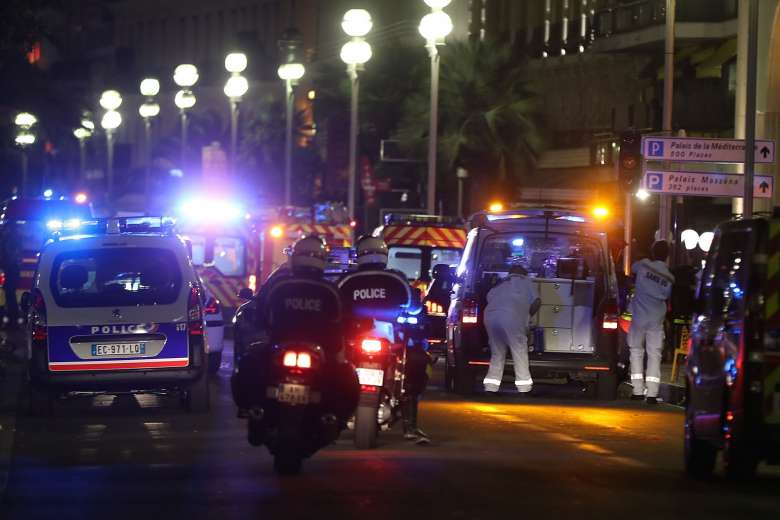(CNN) – At least 73 people were killed Thursday night when a large truck plowed through a crowd celebrating Bastille Day in Nice, France, the Nice prosecutor’s office said, according to French media.
The driver pointed his tractor-trailer into the crowd and accelerated, mowing bodies over. The driver was shot to death, authorities said. At least 100 people were injured, authorities said.
Here are the latest developments in the tragedy:
• The attack in Nice, France, began when an occupant of the truck shot into the crowd and then drove for 2 kilometers along the pavement of the Boulevard des Anglais, the main street in Nice, regional President Christian Estrosi told CNN affiliate BFM-TV. He said police later found firearms, explosives and grenades in the truck.
• Anti-terror prosecutors have taken over the investigation, according to BFMTV, citing the prosecutor’s office.
• Preliminary information from French officials is that there was one individual in the truck, according to a U.S. law enforcement official briefed on the attack. The individual, a male, was killed by police and it does not appear there was any gunfire from the truck, according to the official.
• Subprefect Sebastien Humbert, of the Alpes-Maritimes region, described the incident as a “major criminal attack,” according to AFP.
• The driver of the truck that drove into the crowd was shot dead by police, said Pierre-Henry Brandet, a spokesman for French Interior Ministry. There was no hostage situation at any point, he said.
• U.S. President Barack Obama has been apprised of the situation in Nice and his national security team will update him, said National Security Council spokesperson Ned Price.
• Witness Tony Molina said he can see 70-100 emergency vehicles. Two helicopters have landed, he said. Bodies are covered in blue tarps and marked so emergency vehicles don’t run over them, he said.
• Maryam Violet, a witness, said she was walking along the beach and saw “a ton of people on the ground and on the sidewalk.” “You could see someone with a bike or a wheelchair and someone with a bag full of flowers, innocent and normal people on the beach.”
• French President Francois Hollande is returning to Paris from Avignon for emergency talks at the Interior Ministry after the mass casualty incident in Nice, according to French national radio.
• Facebook has activated the Safety Check feature for people in and around the area of the attack.
• An American witness at the scene said the driver of the truck was mowing bodies over, and that he appeared to accelerate as he hit those bodies. The witness said he saw only the driver. He heard gunfire as he ran away, but did not know its source. It seemed like an accident at first, but it became apparent very quickly that it was deliberate, the witness told CNN.
• BFM posted an image of the truck that reportedly was involved in the incident. The photo shows what appears to be bullet holes in the windshield of the white truck.
• Christian Estrosi, the head of the regional council of Provence-Alpes-Côte d’Azur, said late Thursday: “Dear Nice residents, the driver of a truck appears to have caused tens of deaths. Stay for the moment in your homes. More info to come.”
• Eric Dartell was eating at a restaurant on the street where the incident happened. “You can see wreckage all along the way, a body, bicycles, street lamps and debris everywhere,” he said.


 Forex3 weeks ago
Forex3 weeks ago


 Naira2 weeks ago
Naira2 weeks ago
 Billionaire Watch2 weeks ago
Billionaire Watch2 weeks ago




 Naira2 weeks ago
Naira2 weeks ago




 Naira2 weeks ago
Naira2 weeks ago




 Naira4 weeks ago
Naira4 weeks ago


 Naira7 days ago
Naira7 days ago
 Banking Sector4 weeks ago
Banking Sector4 weeks ago





















